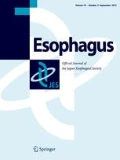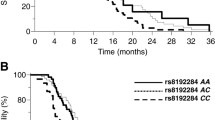Abstract
Background
A reliable marker of the sensitivity of esophageal cancer to chemoradiotherapy (CRT) as well as a personal biomarker predictive of adverse events during treatment has long been sought. The purpose of the present study was to test whether there is an association between interleukin-6 (IL-6) and/or monocyte chemoattractant protein-1 (MCP-1) polymorphisms and CRT-induced bone-marrow suppression––i.e., reductions in white blood cell and/or platelet counts.
Methods
The study participants were 103 Japanese patients treated with definitive or pre-operative CRT for squamous cell esophageal cancer at Akita University Hospital. The patients were divided into two groups, with or without adverse events during or up to 1 month after CRT.
Results
Patient backgrounds––i.e., white blood cell and platelet counts before CRT and doses of chemotherapy and irradiation––did not differ between groups. However, there was a significantly higher incidence of grade 2–4 platelet count reductions (<75,000/mm3) among patients carrying the IL-6 −634C/G+G/G genotype than among those carrying the C/C genotype. Similarly, there was a significantly higher incidence of grade 2–4 platelet count reductions among patients carrying the MCP-1 −2518G/G genotype than among those carrying the A/A+A/G genotype. Univariate and multivariate logistic regression models revealed that the IL-6 −634C>G and MCP-1 −2518A>G polymorphisms were significantly associated with grade 2–4 platelet count reductions following CRT.
Conclusion
These polymorphisms may thus be clinically relevant and should be taken into consideration when devising CRT regimens or treatment strategies for esophageal cancer.

Similar content being viewed by others
References
Chen MF, Yang YH, Lai CH, et al. Outcome of patients with esophageal cancer: a nationwide analysis. Ann Surg Oncol. 2013;20:3023–30.
Kumagai K, Rouvelas I, Tsai JA, et al. Meta-analysis of postoperative morbidity and perioperative mortality in patients receiving neoadjuvant chemotherapy or chemoradiotherapy for resectable oesophageal and gastro-oesophageal junctional cancers. Br J Surg. 2014;101:321–38.
Motoyama S, Sugiyama T, Ueno Y, et al. REG I expression predicts long-term survival among locally advanced thoracic squamous cell esophageal cancer patients treated with neoadjuvant chemoradiotherapy followed by esophagectomy. Ann Surg Oncol. 2006;13:1724–31.
Hayashi K, Motoyama S, Sugiyama T, et al. REG Iα is a reliable marker of chemoradiosensitivity in squamous cell esophageal cancer patients. Ann Surg Oncol. 2008;15:1224–31.
Yoshino K, Motoyama S, Koyota S, et al. Identification of insulin-like growth factor 2 mRNA-binding protein 3 as a radioresistance factor in squamous esophageal cancer cells. Dis Esophagus. 2014;27:479–84.
Hayashi K, Motoyama S, Koyota S, et al. REG I enhances chemo- and radiosensitivity in squamous cell esophageal cancer cells. Cancer Sci. 2008;99:2491–5.
Yoshino K, Motoyama S, Koyota S, et al. IGFBP3 and BAG1 enhance radiation-induced apoptosis in squamous esophageal cancer cells. Biochem Biophys Res Commun. 2011;404:1070–5.
Sato Y, Motoyama S, Nanjo H, et al. REG1A expression status predicts chemosensitivity among advanced thoracic esophageal squamous cell carcinoma patients treated with esophagectomy followed by adjuvant chemotherapy. Ann Surg Oncol. 2013;20:3044–51.
Anthony BA, Link DC. Regulation of hematopoietic stem cells by bone marrow stromal cells. Trends Immunol. 2014;35:32–7.
Skoog T, van’t Hooft FM, Kallin B, et al. A common functional polymorphism (C–>A substitution at position −863) in the promoter region of the tumour necrosis factor-alpha (TNF-alpha) gene associated with reduced circulating levels of TNF-alpha. Hum Mol Genet. 1999;8:1443–9.
Ohtsu A, Boku N, Muro K, et al. Definitive chemoradiotherapy for T4 and/or M1 lymph node squamous cell carcinoma of the esophagus. J Clin Oncol. 1999;17:2915–21.
Buraczynska M, Jozwiak L, Ksiazek P, et al. Interleukin-6 gene polymorphism and faster progression to end-stage renal failure in chronic glomerulonephritis. Transl Res. 2007;150:101–5.
Szalai C, Duba J, Prohaszka Z, et al. Involvement of polymorphisms in the chemokine system in the susceptibility for coronary artery disease (CAD). Coincidence of elevated Lp(a) and MCP-1 −2518G/G genotype in CAD patients. Atherosclerosis. 2001;158:233–9.
Kaushansky K. The molecular mechanisms that control thrombopoiesis. J Clin Invest. 2005;115:3339–47.
Burstein SA. Effects of interleukin 6 on megakaryocytes and on canine platelet function. Stem Cells. 1994;12:386–93.
Heits F, Stahl M, Ludwig D, et al. Elevated serum thrombopoietin and interleukin-6 concentrations in thrombocytosis associated with inflammatory bowel disease. J Interferon Cytokine Res. 1999;19:757–60.
Walston JD, Fallin MD, Cushman M, et al. IL-6 gene variation is associated with IL-6 and C-reactive protein levels but not cardiovascular outcomes in the Cardiovascular Health Study. Hum Genet. 2007;122:485–94.
Nakajima T, Ota N, Yoshida H, et al. Allelic variants in the interleukin-6 gene and essential hypertension in Japanese women. Genes Immun. 1999;1:115–9.
Kitamura A, Hasegawa G, Obayashi H, et al. Interleukin-6 polymorphism (−634C/G) in the promotor region and the progression of diabetic nephropathy in type 2 diabetes. Diabet Med. 2002;19:1000–5.
Ryu JH, Kim SJ. Interleukin-6 −634C/G and −174G/C polymorphisms in Korean patients undergoing hemodialysis. Korean J Intern Med. 2012;27:327–37.
Motoyama S, Nakatsu T, Miura M, et al. Interleukin-6 −634G>C genetic polymorphism associates with prognosis following surgery for advanced thoracic esophageal squamous cell carcinoma. Dig Surg. 2012;29:194–201.
Deshmane SL, Kremlev S, Amini S, et al. Monocyte chemoattractant protein-1 (MCP-1): an overview. J Interferon Cytokine Res. 2009;29:313–26.
Takahashi M, Masuyama J, Ikeda U, et al. Induction of monocyte chemoattractant protein-1 synthesis in human monocytes during transendothelial migration in vitro. Circ Res. 1995;76:750–7.
Milner JD, Orekov T, Ward JM, Cheng L, et al. Sustained IL-4 exposure leads to a novel pathway for hemophagocytosis, inflammation, and tissue macrophage accumulation. Blood. 2010;116:2476–83.
Mira JP, Cariou A, Grall F, et al. Association of TNF2, a TNF-alpha promoter polymorphism, with septic shock susceptibility and mortality: a multicenter study. JAMA. 1999;282:561–8.
Author information
Authors and Affiliations
Corresponding author
Ethics declarations
Ethical Statement
This study was approved by the institutional review boards of Akita University Graduate School of Medicine (#419). Additional informed consent was obtained from all patients for whom identifying information is included in this article.
Conflict of interest
There are no financial or other relations that could lead to a conflict of interest.
Rights and permissions
About this article
Cite this article
Fujita, K., Motoyama, S., Sato, Y. et al. IL-6 and MCP-1 genetic polymorphisms are predictive of decreased platelet counts caused by chemoradiotherapy in esophageal cancer. Esophagus 13, 264–269 (2016). https://doi.org/10.1007/s10388-016-0522-z
Received:
Accepted:
Published:
Issue Date:
DOI: https://doi.org/10.1007/s10388-016-0522-z




